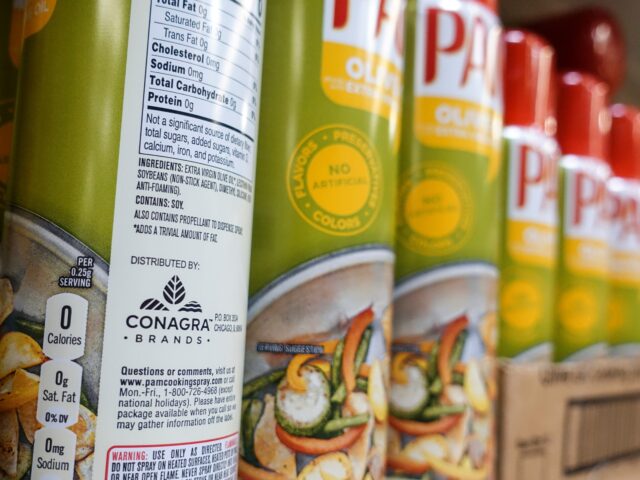A Pennsylvania woman has been awarded $7.1 million in a lawsuit against Conagra Brands after she was badly injured when a can of the manufacturer’s commercial cooking spray ignited and set her aflame.
It was May 2017 when Tammy Reese was going about her day, working in a kitchen at a social club when “suddenly and without warning” a can of Swell cooking spray “exploded into a fireball, causing burns and injuries,” according to her lawsuit obtained by the Associated Press.
Reese sustained deep second-degree burns on her head, face, arms and hands, the outlet reported. According to one of her lawyers, Craig Smith, scar tissue from her injuries still constricts her movement six years later.
A jury decided Monday that Conagra Brands, based out of Chicago, Illinois, must pay $3.1 million in compensatory damages as well as $4 million in punitive damages to Reese, the Cook County Circuit Court verdict said.
Conagra Brands is the parent company of well-known food brands such as Marie Callender’s, Reddi-wip, Swiss Miss, Hunt’s, Chef Boyardee and Slim Jim, as well as the popular grocery store cooking spray Pam, which has also been accused of causing burns.
“This is really the beginning of a serious problem for Conagra,” Peter Flowers, another attorney for Reese, said Tuesday.
Smith explained the accidents involved spray can models of various brands manufactured between 2011 and 2019 that used a venting system with a lower threshold for heat than previous versions. It was explained in the lawsuit that when the can gets too hot, the flammable content gets discharged.
After facing multiple similar lawsuits in 2019, Conagra said the vent system purportedly causing the problem was only used on a limited number of products, but was eventually redesigned that year. The manufacturer claimed the redesign was not related to the lawsuits, but part of an effort to standardize cans across the company.
Following the jury’s verdict against them, Conagra said they disagreed with the outcome and stated the “safety of our products and our consumers is always a top priority of Conagra.”
“We continue to stand by our cooking spray products, which are safe and effective when used correctly, as instructed. We are evaluating our legal options, including appeal,” the statement said.
According to Smith, over 50 cases from other burn victims are currently pending against the company, and they have refused to recall the “defective” cans.
He noted wary consumers should check to see if their cooking spray cans are vented by looking to see if the bottom of the product has four small U-shaped slits, adding that larger spray cans — 10 oz. or more — are riskier than the regular-sized 6 oz. cans in general.
Flowers said the spray that burned Reese had been stored on a shelf about 18-inches above the stove, which is “normal.”
“In a commercial kitchen, that’s a sort of normal place where people leave their cooking spray cans when they’re actually using them. And the same thing has happened all across the country, not necessarily on shelves above stoves, but on shelves near stoves, on countertops,” he said.
“Conagra says Pam and other cooking sprays have clear warning labels on the front and back telling consumers the product is flammable and should not be left on or near a stove or heat source,” the AP noted. “Cooking spray shouldn’t be stored above 120 degrees or sprayed near an open flame, the company said.”

COMMENTS
Please let us know if you're having issues with commenting.